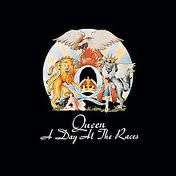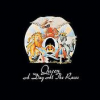 Originally published by L.S. Media. March 22nd 2011.
Originally published by L.S. Media. March 22nd 2011.
Following on from their smash hit A Night at the Opera, Queen once more delved into the world of The Marx Brothers for inspiration for the title of their next album. They didn’t have to look too far as they chose the name that would have been next on the film list. A Day at the Races became the bands second number one album and although arguably nowhere near as strong as its four predecessors in its direction or overall feel it still marked an important change in the band’s approach and how they were looked upon.
At the time of its release Rolling Stone were critical of Freddie’s voice and whilst it can be seen that there was less of an edge to it and certainly less humour within the band’s playing, it had elements that make it a worthwhile addition to the Re-Mastered edition. Chief amongst them is the stand out track Good Old Fashioned Lover Boy, with its Vaudeville style routine and its cheeky, innuendo ridden lyrics. It would be one song from the album that could grace the grooves of any of the albums that the band ever produced.
That said, in general, the album has the feel of being the least distinguished, the less accomplished piece of work by the band bar one. It doesn’t have the long awaited moments of passion or soul that the others had and as a listener you can feel bogged down in waiting for these moments to arrive.
This album is the fifth to be re-mastered by Universal Music and as an overall arc, it is good to have these albums back in the conscious of music fans everywhere and the process has been astonishing. It can only be hoped that at some point during the year, they release the next batch as it marks the next phase of a story by one of Britain’s favourite groups.
Whether you see this as a bad attempt at blatant commercialism and a record company out to make money is up to you, but there will be new fans that this has opened the door to, even if it’s just an insight or a brief glimpse into the world of real, untainted by commercialism music where the writers are in it for the creativity and enjoyment.
Ian D. Hall
